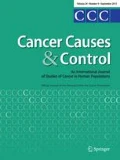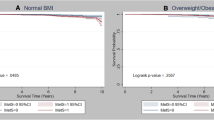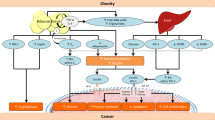Abstract
Background
Obesity is a strong risk factor for endometrial cancer, but it is unclear whether metabolic syndrome (MetS) contributes to endometrial cancer risk over and above the contribution of obesity.
Methods
We examined the association of MetS and its components with risk of endometrial cancer in a sub-cohort of 24,210 women enrolled in the Women’s Health Initiative cohort study. Two variants of the National Cholesterol Education Program Adult Treatment Panel III definition of the MetS were used: one including and one excluding waist circumference (WC). Cox proportional hazards models were used to estimate the association of the study exposures with disease risk.
Results
When WC was included in the definition, MetS showed an approximately two-fold increase in endometrial cancer risk (HR 2.20; 95% CI 1.61–3.02); however, when WC was excluded, MetS was no longer associated with risk. We also observed that women with hyperglycemia, dyslipidemia and hypertension, in combination, had almost a twofold increased risk of endometrial cancer, independent of WC (HR 1.94; 95% CI 1.09, 3.46). Glucose, and, in particular, WC and body mass index were also positively associated with risk.
Conclusions
Our findings suggest that MetS may predict risk of endometrial cancer independent of obesity among women with the remaining four Mets components.
Similar content being viewed by others
Data availability
The datasets used and/or analysed during the current study are available from the Women’s Health Initiative Coordinating Center on reasonable request.
References
Grundy SM, Cleeman JI, Daniels ST, Donato KA, Eckel RH, Franklin BA et al (2005) Diagnosis and management of the metabolic syndrome: an American Heart Association/National Heart, Lung, and Blood Institute Scientific Statement. Circulation 112:2735–2752
Moore JX, Chaudhary N, Akinyemiju T (2017) Metabolic Syndrome Prevalence by Race/Ethnicity and Sex in the United States, National Health and Nutrition Examination Survey, 1988–2012. Prev Chronic Dis 14:E24
Galassi A, Reynolds K, He J (2006) Metabolic syndrome and risk of cardiovascular disease: a meta-analysis. Am J Med 119:812–919
Lorenzo C, Okoloise M, Williams K, Stern MP, Haffner SM (2003) The metabolic syndrome as predictor of type 2 diabetes: the San Antonio Heart Study. Diab Care 26:3153–3159
Cust AE, Kaaks R, Friedenreich C, Bonnet F, Laville M, Tjønneland A et al (2007) Metabolic syndrome, plasma lipid, lipoprotein and glucose levels, and endometrial cancer risk in the European Prospective Investigation into Cancer and Nutrition (EPIC). Endocr Relat Cancer 14:755–767
Bjørge T, Stocks T, Lukanova A, Tretli S, Selmer R, Manjer J et al (2010) Metabolic syndrome and endometrial cancer. Am J Epidemiol 171:892–902
Friedenreich C, Biel RK, Lau DCW, Csizmadi I, Courneya KS, Magliocco AM et al (2011) Case–control study of the metabolic syndrome and metabolic risk factors for endometrial cancer. Cancer Epidemiol Biomarkers Prev 20:2384–2395
Rosato V, Zucchetoo A, Bosetti C, Dal Maso L, Montella M, Pelucchi C et al (2011) Metabolic syndrome and endometrial cancer. Ann Oncol 22:884–889
Trabert B, Wentzensen N, Felix AS, Yang HP, Sherman ME, Brinton LA (2015) Metabolic syndrome and risk of endometrial cancer in the United States: s study the SEER-Medicare-linked database. Cancer Epidemiol Biomarkers Prev 24:261–267
Stocks T, Bjørge T, Ulmer H, Manjer J, Häggström C, Nagel G et al. (2015) Metabolic risk score and cancer risk: pooled analysis of seven cohorts. Int J Epidemiol 44:1353–1363
Esposito K, Chiodini P, Capuano A, Bellastella G, Maiorino MI, Giugliano D (2014) Metabolic syndrome and endometrial cancer: a meta-analysis. Endocrine 45:28–36
Anderson GL, Manson J, Wallace R, Lund B, Hall D, Davis S et al (2003) Implementation of the Women’s Health Initiative study design. Ann Epidemiol 13:S5–S17
Langer RD, White E, Lewis CE, Kotchen JM, Hendrix SL, Trevisan M (2003) TheWomen’s Health Initiative Observational Study: baseline characteristics of participants and reliability of baseline measures. Ann Epidemiol 13:S107–S121
McTiernan A, Kooperberg C, White E, Wilcox S, Coates R, Adams-Campbell LL et al (2003) Recreational physical activity and the risk of breast cancer in postmenopausal women: the Women’s Health Initiative Cohort Study. JAMA 290:1331–1336
Curb JD, McTiernan A, Heckbert SR, Kooperberg C, Stanford J, Nevitt M et al. Outcomes ascertainment and adjudiciationmethods in the Women’s Health Initiative. Ann Epidemiol. 13:S122–8
Setiawan VW, Yang HP, Pike MC, McCann SE, Yu H, Xiang YB et al (2013) Type I and II endometrial cancer: have they different risk factors? J Clin Oncol 31:2607–2618
Zhou B, Yang L, Sun Q, Cong R, Gu H, Tang N et al (2008) Cigarette smoking and the risk of endometrial cancer: a meta-analysis. Am J Med 121:501–508.e3
Donohoe CL, Doyle SL, Reynolds JV (2011) Visceral adiposity, insulin resistance, and cancer risk. Diabetol Metab Syndr 3:12. https://doi.org/10.1186/1758-5996-3-12
Kabat GC, Kim MY, Lane DS, Zaslavsky O, Ho GYF, Luo J et al (2018) Serum glucose and insulin and risk of cancers of the breast, endometrium, and ovary in postmenopausal women. Eur J Cancer Prev 27:261–268
Marshall S, Bacote V, Traxinger RR (1991) Discovery of a metabolic pathway mediating glucose induced desensitization of the glucose transport system. Role of hexosamine biosynthesis in the induction of insulin resistance. J Biol Chem 266:4706–4712
Vigneri R, Goldfine ID, Frittitta L (2016) Insulin, insulin receptors, and cancer. J Endocrinol Invest 39:1365–1376
Dang CV, Semenza GL (1999) Oncogenic alternations of metabolism. Trends Biochem Sci 24:68–72
Koppenol WH, Bounds PL, Dang CV (2011) Otto Warburg’s contributions to current concepts of cancer metabolism. Nat Rev Cancer 11:325–337
Cust AE, Allen NE, Rinaldi S, Dossus L, Friedenreich C, Olsen A et al (2007) Serum levels of C-peptide, IGFBP-1 and IGFBP-2 and endometrial cancer risk: results from the European prospective investigation into cancer and nutrition. Int J Cancer 120:2656–2664
Funding
This work was supported by institutional funds from the Albert Einstein College of Medicine.
Author information
Authors and Affiliations
Contributions
Conception and design: TER, GCK, RA; Development of methodology: GCK, TER, RA; Acquisition of data: GCK; Analysis and interpretation of data (e.g., statistical analysis, biostatistics, computational analysis): GCK, TER, RA, MYK; Writing, review, and/or revision of the manuscript: GCK, TER, RA, MYK, RAW, AHS, JW-W, GYFH, KWR, LHK, JL, JB-D, MSS, HS, SW-S.
Corresponding author
Ethics declarations
Conflict of interest
No potential conflicts of interest were disclosed.
Additional information
Publisher’s Note
Springer Nature remains neutral with regard to jurisdictional claims in published maps and institutional affiliations.
Electronic supplementary material
Below is the link to the electronic supplementary material.
Rights and permissions
About this article
Cite this article
Arthur, R.S., Kabat, G.C., Kim, M.Y. et al. Metabolic syndrome and risk of endometrial cancer in postmenopausal women: a prospective study. Cancer Causes Control 30, 355–363 (2019). https://doi.org/10.1007/s10552-019-01139-5
Received:
Accepted:
Published:
Issue Date:
DOI: https://doi.org/10.1007/s10552-019-01139-5




